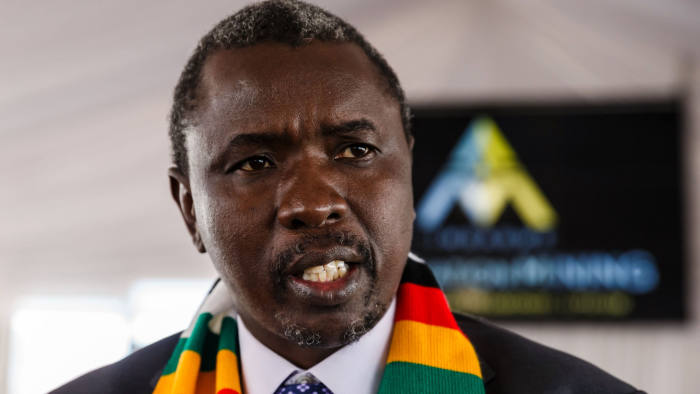Donald Mlambo
WHEN the Zimbabwe government made an unexpected announcement in December 2020 that it was the majority owner of a new mining company with assets straddling the platinum, gold, Chrome and nickel sectors, it immediately raised questions on how President Emmerson Mnangagwa’s cash-strapped administration funded acquisition of the $2 billion assets.
The timing of the Kuvimba Mining House deal has all pointed to a cover-up by the state and business tycoon Kudakwashe Tagwirei, who until that moment owned the assets through his Mauritius registered Sotic International.
What makes it even more curious is that the government has to date not disclosed the purchase price of the shares and how it came to a $2 billion valuation of the assets.
But some government and local mining industry officials said Tagwirei and the government created Kuvimba to shield the businessman’s mining companies from the United States and British financial sanctions that would have crimped their operations. To this day, the government insists Tagwirei is not a shareholder in Kuvimba but indications of the ground may suggest otherwise.
Questions still linger over government’s claim to 65 percent of Kuvimba with the remainder belonging to Ziwa Investments, another privately registered Zimbabwean company. A company with a similar name is registered in London.
Even more curious, is that Kuvimba was created and registered in September 2020 with an identical shareholder structure to Sotic: Almas Global Opportunity Fund SPC held 65 percent and Pfimbi Ltd., whose sole shareholders are Tagwirei and his wife, held the remaining 35 percent.
But there is a downside to what analysts consider a “massive cover-up”, and it may have come sooner than expected.
Impala Platinum, the world’s second-biggest platinum miner, which has the biggest mining operations in Zimbabwe was approached by Great Dyke Investments (GDI), in which Kuvimba owns 47 percent shares, to invest in the project. GDI, which is jointly owned by Kuvimba and Russian state companies, is billed to become the southern African nation’s biggest platinum miner.
Impala, has however, sought greater transparency around the ownership of Kuvimba before making any commitment to invest in GDI, which has stalled a deal, Bloomberg reported recently.
Impala is concerned it could be caught up in the crosshairs of U.S. and British sanctions.
GDI has since 2020 struggled to raise $500 million for the first phase of mining operations, in large part due to Tagwirei’s involvement.
Now, raising funding may become even more complex with western sanctions on Russia following its invasion of Ukraine on February 24.
“At some point, the government will have to come clean on Kuvimba if the company is to become the mining behemoth that it wishes it to be. There are very few financiers out there with deep pockets and are willing to invest in Zimbabwe and transparency is very key to avoid being caught up in western sanctions,” a Johannesburg-based commodities analyst who declined to be named said.
Kuvimba desperately needs capital and technology to expand, and these are available outside Zimbabwe, but analysts said it would be difficult to attract partners and financiers into a business lacking transparency.
Questions still linger over government’s claim to 65 percent of Kuvimba while the remainder belongs to Ziwa Investments, a privately registered Zimbabwean company. There is a London-registered firm with a similar name.
Government and mining officials said it was unthinkable that Tagwirei could just wake up and hand over ownership of his $2 billion mining empire to the government without any quid pro quo.
“Tagwirei had everything figured out with the Sotic structure but he had to be pragmatic to avoid U.S. sanctions. The whole Kuvimba arrangement smells of a cover-up but it will unravel at some point because everyday people are peeling off the outer edges of that deal,” said a government official who has followed the Kuvimba issue.
“I don’t have the evidence yet, but I have no doubt in my mind that State House has been complicit in this arrangement all the way,” he said.
In 2019, Tagwirei through his Sakunda Holdings, cashed on government Treasury bills to fund the acquisition of mines in Zimbabwe via Landela Mining Ventures, a Sotic subsidiary.
But a year later, as U.S. and British sanctions loomed, Tagwirei saw no safer haven for his assets than a Zimbabwean-domiciled vehicle. Kuvimba Mining House was formed to shield the assets from the effects of the sanctions, a government official claimed.
Last month, Zimbabwe’s government announced that Kuvimba was its preferred bidder for the decrepit Zimbabwe Iron and Steel assets, which include some of the richest iron ore deposits.
That has raised questions over the government’s capacity to revive the moribund company, whose steel mills have been cold for two decades.
Analysts questioned how a government that could not raise funding to rescue ZISCO, in which it has an 89 percent stake, wanted the nation to believe that Kuvimba, in which it claims a 65 shareholding can get funding for the company to run again.
The Zimbabwean government, which owes foreign creditors more than $10 billion, is not creditworthy and would struggle to attract financing for its companies.
Reports are that Kuvimba has still not fully paid for the Mazowe and Redwing gold mines and analysts question how the mining house is going to come up with half a billion dollars that is required to restart Zisco steel without the help of outside funding.
In its current state and structure, Kuvimba is closed for business with foreign partners and funders, contrary to President Mnangagwa’s “Zimbabwe is Open for Business’ mantra.


